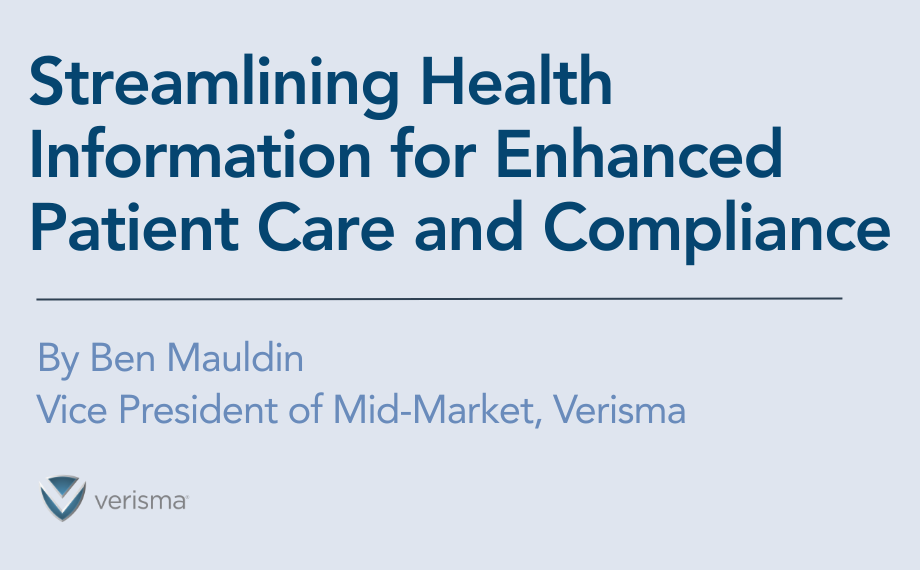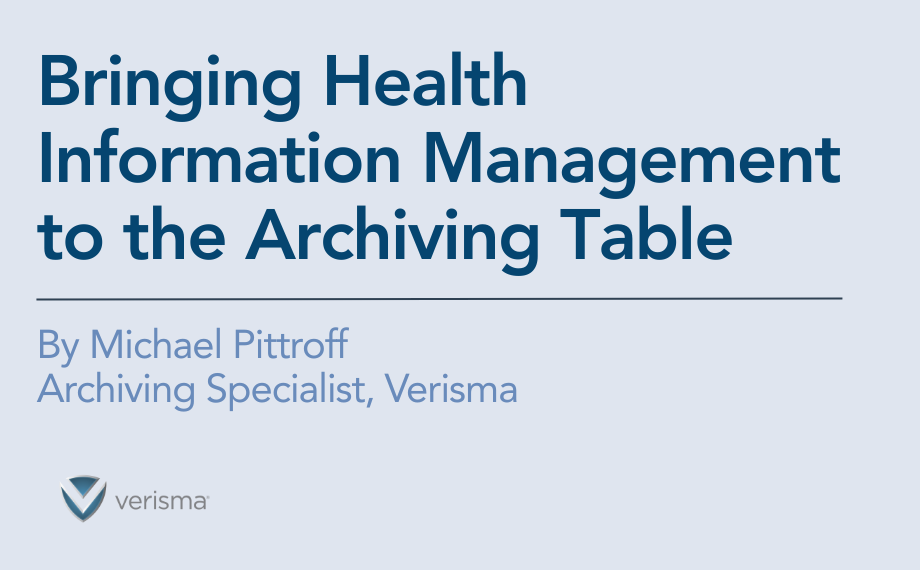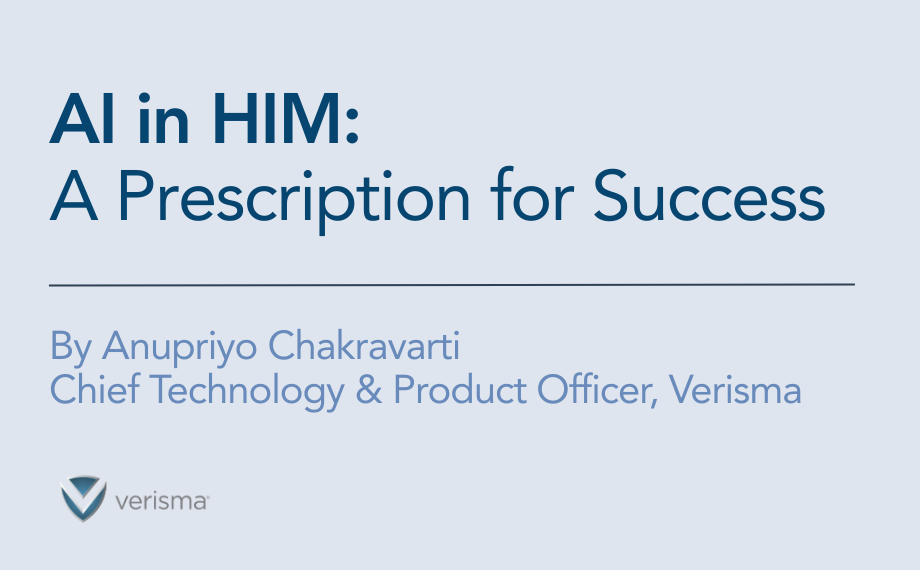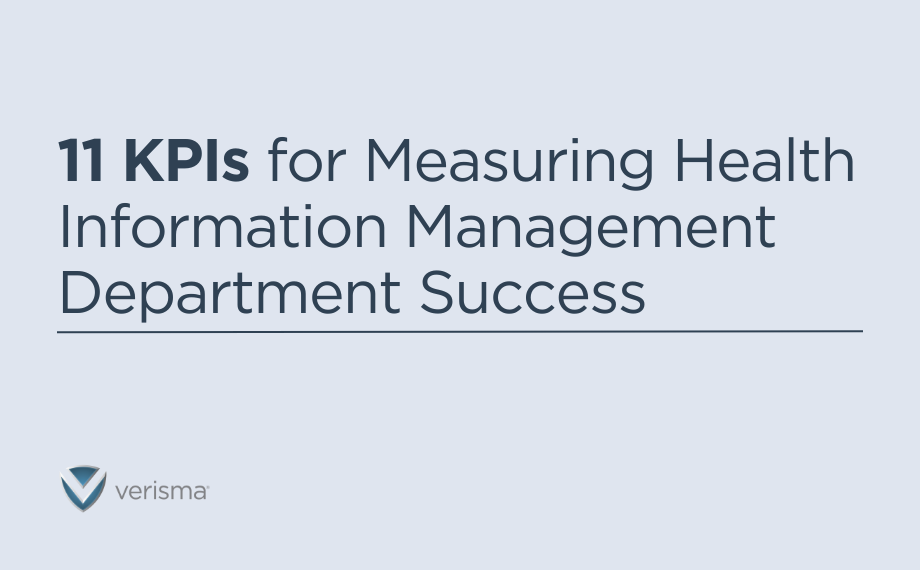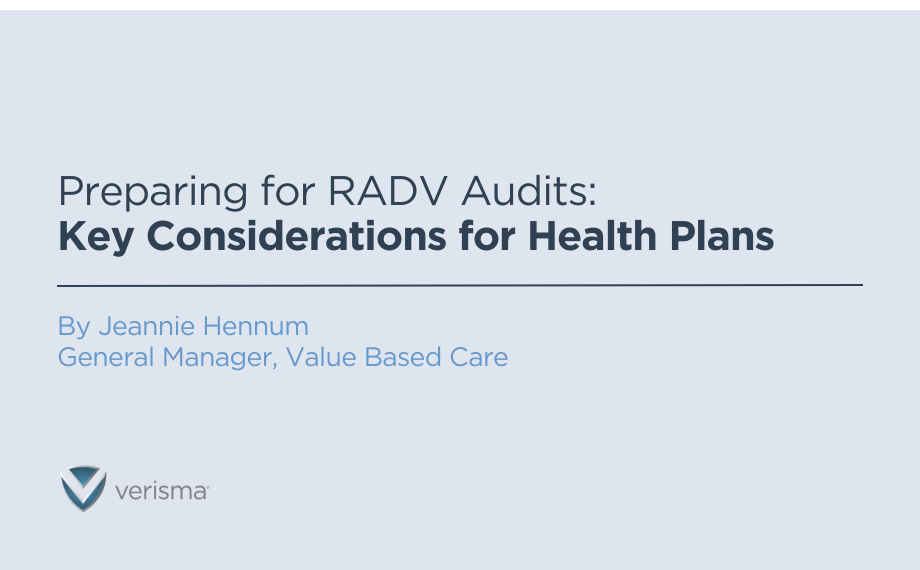
In the healthcare industry, key performance indicators (KPI) and data analysis are critical to ensuring organizations stay on track to meet strategic goals. As one comprehensive case study shows, analyzing the right KPIs and effectively communicating them to other stakeholders can help create trusted healthcare benchmarks, emphasize the value of the health information management department, and develop staff pride in their performance.
In fact, KPIs can help organizations measure and improve the quality of care delivered, while providing key insights for boosting revenue integrity, operational efficiency, and so much more.
But determining what kind of data to collect can be difficult for many organizations, particularly amid staffing challenges and fast-paced environments. Here are 11 well-defined performance measures that every health information management department should monitor.
1. Data Accuracy and Completeness
This metric accounts for the percentage of errors or incomplete data present in patient records. Data accuracy KPIs could include the frequency of patient name misspellings, date of birth transpositions, or missing addresses.
Why It Matters
Accurate and complete data contributes to robust data analytics and accurate coding for healthcare. It also helps prevent duplicate records and enables efficient health information exchange (HIE). Errors and omissions — particularly those that can occur during data migration, as discussed in a blog on the Olah website — may lead to inaccurate conclusions, mistrust, and poorly informed decisions.
2. Data Accessibility and Availability
Data accessibility refers to the amount of time it takes for a provider or staff member to access data — including legacy data — in the electronic health record (EHR). Examples of this metric include the time it takes to access data, the data request success rate, the data discoverability score, metadata completeness, platform uptime, and EHR time per patient.
Why It Matters
Data accessibility is a critical metric that can help an organization identify lag time or bottlenecks that impact providers’ ability to spend quality time with their patients. Promoting efficient access to EHR data, including archived data, at the point of care supports patient safety and high-quality patient care.
3. Turnaround Time for Information Requests
Turnaround time accounts for the amount of time it takes a covered entity — or a business associate working on its behalf — to share information in the EHR with individuals or their personal representatives.
By law, covered entities must provide access to protected health information (PHI) within 30 calendar days from receiving the individual’s request. This metric helps an organization evaluate whether they’re meeting that requirement or not. It can also include the average turnaround time for data requests, first response time, or response time service level agreement compliance.
Why It Matters
Providers can be fined for not complying with timely access requirements under HIPAA. Providing individuals with easy access to their health information empowers them to be more in control of decisions related to their health and well-being. Timely responses are also important in terms of maintaining positive patient relationships.
4. Medical Coding Accuracy
This metric helps organizations evaluate the percentage of incorrectly coded diagnoses and procedures, which can impact both revenue cycle management and patient care. This category of KPIs includes each department’s coding accuracy rate, coding error rate, correct DRG rate, audit pass rate, and denial rate due to coding.
Why It Matters
Coding for healthcare requires precision. Coded data drives clinical care, payment, research, and more. It’s important to assign accurate and complete medical codes to promote data and revenue integrity.
5. Regulatory Standards Compliance
For operational and finance teams, this metric is particularly critical. It accounts for the number of errors resulting in fees, HIPAA violations, or regulatory violations. That could include the number of data breaches reported, medication error rate, or the frequency of overbilling incidents.
Why It Matters
Over time, healthcare regulatory compliance fees and violations create an enormous financial burden. They can also jeopardize patient safety and cause reputational harm. This KPI can help organizations identify and rectify costly errors related to federal, state, or local regulations to preserve revenue integrity.
6. Patient Privacy and Data Security Incident Rate
Patient privacy is crucial not only to protecting patients as they move through the healthcare system but also to avoiding costly, disruptive, and time-consuming noncompliance situations. This KPI focuses on the number of attempted and/or successful data breaches over a specific period, which can include metrics such as incident rate, time to detect, time to respond, volume of data exposed, or policy violation rate.
Why It Matters
Monitoring these metrics helps healthcare organizations avoid costly data breaches that may require compliance with breach notification requirements, participation in a resolution agreement with the Office for Civil Rights, and payment of a civil monetary penalty. These KPIs help ensure data protection, compliance, and operational stability.
7. Record Retention Compliance
Record retention compliance refers to the number of times a hospital doesn’t adhere to state-specific record retention guidelines. Metrics under this category could include retention compliance rate, the volume of records past retention, record retention audit findings, and user adherence rate.
Why It Matters
Retaining records according to state requirements is important for legal compliance, such as in the event of an investigation, audit, or lawsuit. It can also be crucial for continuity of care, public health and research, and healthcare regulatory compliance with patient access requirements. Monitoring relevant health information management department KPIs ensures organizations can provide the best possible patient care and defend themselves in legal matters.
8. EHR Utilization Rate
EHR utilization rate is the number of individual organizations or staff members who use the systemwide EHR for their work. There are several metrics under this category, including EHR log-in frequency (especially during patient visits), chart completion time, note completion rate, inbox management time, clinical decision support engagement, order entry rate, and use of templates or smart phrases.
Why It Matters
These metrics help healthcare organizations pinpoint areas for EHR enhancements to ease the burden on physicians and improve patient care. They also ensure providers can use EHRs for patient care coordination, operational efficiency, and healthcare regulatory compliance.
9. Medical Chart Abstraction Timeliness
Providers and staff need efficient ways to access data, as tracking information down manually can be time-consuming. This KPI accounts for the amount of time it takes for a staff member to extract specific data from a medical record.
Examples of this metric category include turnaround time from chart availability to completion of abstraction, medical chart abstraction completeness rate, medical chart abstraction accuracy rate, medical chart abstraction error rate, and charts abstracted per hour or day.
Why It Matters
Monitoring these KPIs helps healthcare organizations promote timely clinical decision making, billing, and data submission. It also helps organizations track health outcomes, identify trends for improvement, and support population health efforts.
10. Cost per Medical Record Processed
This finance-oriented KPI is the dollar amount per record associated with ensuring payment for services rendered. It includes several key metrics, including the cost to collect, the total cost of collections, and the total cash collected.
Why It Matters
These health information management department KPIs are important because they measure the efficiency of a healthcare organization in collecting the money it’s owed. By analyzing this data, organizations can identify where they might be losing money to inefficiencies or errors.
11. Revenue Cycle Efficiency
While there are a number of KPIs related to revenue, this one focuses on how quickly a healthcare organization can collect money owed. In short, it measures an organization’s financial efficiency and cash flow. Specific metrics under this category include accounts receivable days, write-off rate, net collection rate, claim denial rate, first pass resolution rate, bad debt rate, and patient collections.
Why It Matters
Revenue cycle management is critical to any healthcare organization, as it can impact the organization’s ability to retain staff, effectively care for patients, and maintain financial sustainability. Monitoring these KPIs helps healthcare organizations pinpoint areas for revenue cycle improvement that can enhance cash flow and promote long-term financial stability.
Leveraging Health Information Management To Support Data Efforts
Tracking the right KPIs helps maintain the efficiency, security, and profitability of a healthcare organization. Poor data quality, subpar data protection, and data inaccessibility undermine efforts to improve performance.
That’s why it’s important for health information management departments to set the stage for success. Regularly monitoring and analyzing the right KPIs can improve care, enhance operational efficiency, and ensure compliance with healthcare regulations. Working with a strategic partner like Verisma can help you zero in on how to identify and use insights from that information to improve your HIM operations. Contact us today to learn more.
